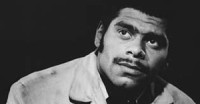Günther Kaufmann died unexpectedly on May 10.
 A German actor of many facets, on film and in life
A German actor of many facets, on film and in life
Günther Kaufmann, once known as the “Bavarian negro” on account of his exotic appearance, would soon have celebrated his sixty-fifth birthday and plans had been made to film his life story in the coming year under the working title of Die zweite Garnitur Gottes (God’s Second League). Now everything has changed. Kaufmann died of a sudden heart attack on May 10, 2012 while walking in the Berlin district of Grunewald.
Günther Kaufmann was born on June 16, 1947, a so-called “occupation child” of a US soldier and a German in Munich-Schwabing, and grew up in Hasenberg, a Munich suburb characterized by social problems. After elementary school he joined the navy and for four years was a crew member on the training ship “Gorch Fock.” After completing his military service and only partially completing an apprenticeship, Kaufmann supported himself with part-time jobs and small film roles. The turning point came in 1969 when he met Fassbinder while working on Volker Schlöndorff’s television film version of Brecht’s BAAL. Fassbinder was fascinated by Kaufmann’s seductive qualities on and off screen and enlisted the actor in his antiteater group, where he developed and made deliberate use of the actor’s commanding presence, casting him in a series of rapidly produced films (including GODS OF THE PLAGUE, made in 1969 and starring Harry Baer) and stage plays such as The Coffee House (based on the comedy by Goldoni). In WHITY (1970), a melodrama set in the American South, Kaufmann plays the red-liveried man-servant of the Nicholson family, the illegitimate son of the family patriarch. Enslaved because of his skin color, he ultimately kills the entire family.
Following his performance in PIONEERS IN INGOLSTADT (1970), Kaufmann took several years off from acting, although he continued his artistic and business relationship with Fassbinder’s composer Peer Raben. In 1978 he appeared in Fassbinder’s THE MARRIAGE OF MARIA BRAUN, in which he played an American GI stationed in West Germany. He subsequently went on to appear in BERLIN ALEXANDERPLATZ (1979/80), LOLA und VERONIKA VOSS (both 1981), and QUERELLE (1982). Following Fassbinder’s death he had difficulty finding work in German cinema and moved to Portugal. In the 1990s, however, he returned to acting, for German television, including in the ZDF series DER ALTE and DERRICK and in children’s films such as WICKI UND DIE STARKEN MÄNNER (2009) directed by Michael (Bully) Herbig.
Kaufmann’s eventful private life reached a low point in 2002 with his conviction for extortion leading to death, which was based on his own incriminating false testimony. It seems that Kaufmann incriminated himself in order to protect his wife, who was suffering from cancer at the time and is thought to have been involved in the murder in question and died shortly before Kaufmann’s trial. In 2003, three men admitted to the German police that they had carried out the murder, which led to a declaration of Kaufmann’s partial innocence.
After his release from jail at the beginning of 2004, Kaufmann took part in director Johann Kresnik‘s notorious production of The Ten Commandments in Bremen. In 2005 his autobiography, titled Der weiße Neger vom Hasenbergl (The White Negro from Hasenbergl), was published. Günther Kaufmann played his final role in the German film TURKISH FOR BEGINNERS (2012).
Photo left: © DasErste.de
Photo right: Günther Kaufmann in WHITY, 1970 © RWFF